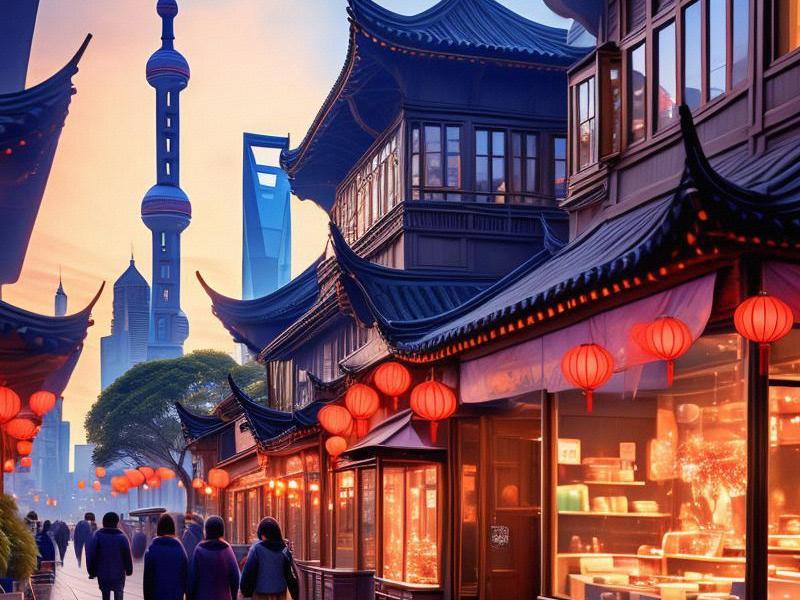
Nestled on the banks of the Huangpu River, Shanghai stands as a beacon of China's economic and cultural prowess. Known as the "Pearl of the Orient," this dynamic metropolis is a living testament to the harmonious coexistence of tradition and modernity. Shanghai's life and culture are a fascinating blend of history, art, cuisine, and urban development, making it a must-visit destination for anyone seeking to understand the complexities of Chinese society.
Historical Neighborhoods: A Glimpse into the Past
One cannot fully appreciate Shanghai without exploring its historical neighborhoods, which offer a window into the city's rich past. The Bund, a waterfront area along the Huangpu River, is a prime example. Once the financial hub of colonial Shanghai, the Bund is now a popular tourist destination, lined with grandiose buildings from the early 20th century. These structures, a mix of Gothic, Baroque, and Romanesque styles, stand in stark contrast to the modern skyscrapers of Pudong across the river.
Nanjing Road, one of the world's busiest shopping streets, also has a historical charm. While it is now a bustling commercial area, its origins date back to the Ming Dynasty. Walking along this iconic street, one can still find traces of old Shanghai, such as the Art Deco-style buildings that were constructed in the 1920s and 1930s.
Modern Urban Development: A Vision of the Future
While Shanghai's historical neighborhoods provide a glimpse into the past, the city's modern urban development showcases its vision for the future. Pudong, once a rural area, has transformed into a global financial center, home to some of the tallest buildings in the world, including the iconic Oriental Pearl Tower and the Shanghai Tower. The Lujiazui Financial District, located in Pudong, is a symbol of China's economic rise and a hub for international business.
新上海龙凤419会所 Shanghai's modern infrastructure is equally impressive. The city boasts an extensive metro system, efficient public transportation, and cutting-edge technology. The Maglev train, which connects Pudong International Airport to the city center, is a marvel of modern engineering, offering a fast and smooth ride at speeds of up to 430 kilometers per hour.
Art and Culture: A Flourishing Scene
Shanghai's art and culture scene is a vibrant tapestry of traditional and contemporary influences. The city is home to numerous museums, galleries, and cultural institutions, such as the Shanghai Museum, which houses an impressive collection of Chinese art, and the Power Station of Art, a former power plant turned contemporary art museum.
The Shanghai International Film Festival, one of the oldest and most prestigious film festivals in Asia, attracts filmmakers and audiences from around the world. The city's theater scene is equally dynamic, with a wide range of performances, from traditional Chinese opera to avant-garde plays.
Shanghai's art districts, such as the M50 Creative Park and the West Bund Art & Design, are hotspots for artists and art enthusiasts. These areas feature a diverse array of galleries, studios, and exhibitions, showcasing both local and international talent.
Cuisine: A Culinary Journey
419上海龙凤网 No exploration of Shanghai's life and culture would be complete without a mention of its cuisine. Shanghai is renowned for its unique culinary style, which combines the flavors of the Jiangnan region with influences from other parts of China and beyond. The city's signature dishes include Xiaolongbao (soup dumplings), Shengjianbao (pan-fried dumplings), and Lion's Head Meatballs.
Shanghai's night markets are a feast for the senses, offering a wide variety of street food, from grilled skewers to sweet desserts. The city's restaurants, ranging from traditional shikumen (stone gate) houses to modern fine-dining establishments, cater to all tastes and budgets.
Heritage and Traditions: Preserving the Past
Despite its rapid modernization, Shanghai remains committed to preserving its heritage and traditions. The city has taken significant steps to protect its historic buildings and cultural sites. The Yu Garden, a classical Chinese garden built in the Ming Dynasty, is a prime example of Shanghai's efforts to preserve its cultural heritage.
Shanghai also celebrates its traditions through various festivals and events. The Dragon Boat Festival, celebrated with dragon boat races and the making of zongzi (sticky rice dumplings), is one of the most important traditional festivals in the city. The Mid-Autumn Festival, marked by mooncakes and family reunions, is another cherished occasion.
上海龙凤419 Education and Innovation: A Hub of Knowledge
Shanghai is not only a center of culture and commerce but also a hub of education and innovation. The city is home to some of the top universities in China, such as Fudan University and Tongji University, which attract students from around the world. Shanghai's research institutions and technology parks are at the forefront of scientific and technological advancements, driving the city's economic growth.
The city's commitment to innovation is evident in its smart city initiatives, which leverage technology to improve urban living. From intelligent transportation systems to digital government services, Shanghai is a model for sustainable urban development.
Conclusion: A City of Contrasts
Shanghai is a city of contrasts, where ancient traditions coexist with modern innovations. Its historical neighborhoods, modern urban development, vibrant art scene, rich culinary traditions, and commitment to preserving heritage make it a unique and fascinating destination. Whether you are strolling along the Bund, exploring Pudong's skyscrapers, or savoring the flavors of Shanghai's cuisine, the city offers an unforgettable experience that captures the essence of China's past and future.
As Shanghai continues to grow and evolve, it remains a testament to the resilience and adaptability of its people. The city's ability to blend tradition with modernity, while preserving its cultural identity, is a story that resonates far beyond its borders. Shanghai is not just a city; it is a living, breathing testament to the dynamic spirit of China.
